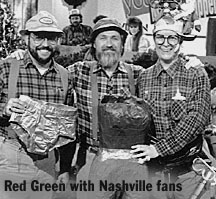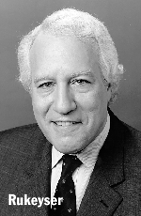

| Listeners & viewers |
  Fans bring large objects wrapped in duct tape to the star of The Red Green Show, while Louis Rukeyser gets viewers' family pictures.
|
Groupies, pubcasting-styleA zealous but mostly level-headed lotOriginally published in Current, Dec. 16, 1996 By Geneva Collins We set out to find folks who were just kookie for Cokie or hooked on Hercule Poirot. Would there be Frug groupies, Diana Rigg cross-dressers, Bailey White impersonators, the NewsHour obsessed? We found very few examples of truly irrational behavior, darn it, and an army of rational, articulate people with big coffee mug collections. Perhaps the most striking common denominator among the diverse audience members interviewed is how frequently pubcasting personalities were described as being like family. A typical fan is Scarlett Foster, a director of public affairs for Monsanto Co. in St. Louis, who met Morning Edition host Bob Edwards at a KWMU event and told him, "You're the only man I've woken up with consistently for the past 10 years." Although the remark may seem flirtatious, Foster said she meant to convey how she values the consistency of the NPR newscasters. She was able to bring them along when she moved from Charleston, W.Va., to St. Louis a few years back. During her frequent business travels, one of the first things she does is locate the public radio station on the dial. "You value that consistency and it becomes your consistency. You do feel like you know them and care about what happens to them," said Foster, who also loves NPR's Car Talk, BBC newscasts and The World Cafe. She is such a fan of Wisconsin Public Radio's Whad'Ya Know? and its host, Michael Feldman, that she's been recruited for on-air pitches. Weekend Edition Saturday host Scott Simon was the only one who could tell us a deranged fan story. Simon said he doesn't like to talk about the "nut country" cases because it just encourages such behavior, but there was a woman who often wrote him, "and it was clear she was hearing things in the broadcast that weren't there." Three or four years ago she showed up at his apartment building and convinced everyone that she was his fiancee--even got real estate agents to show her vacant apartments--because she had picked up so many personal details about Simon's life from years of listening to his show. Of course, there are stories about Red Green fans who wrap large objects in duct tape and wait in the rain to attend personal appearances by the star of the Canadian comedy series. And there's reportedly a woman who flies to other cities to work pledge drives where any EastEnders actor is guesting. But duct tape is not that expensive, and the woman's husband is an airline employee, and these provocative imported programs are not really products of U.S. public broadcasting anyway. Far more typical, said Simon, are the legions of very nice people who come up and talk to you practically in mid-conversation, assuming that since they know you so well you must know them. Or the stranger at the health club Simon met while on assignment in Detroit: Simon asked, "Do you know where I can buy a razor?" and the man replied, "Here, Scott--have one of mine." Or, as Frugal Gourmet executive producer Nat Katzman recounted, they are people like the Jeff Smith fan who called Katzman in San Francisco from somewhere in the Midwest, "and in a wonderfully naive way asked if Jeff could come join them for Christmas dinner." "Yes, it's very much like a family relationship," financial guru Louis Rukeyser said about fans of Wall Street Week with Louis Rukeyser. "If I get a different haircut, we get hundreds of letters telling us whether they like it or not. People send us poems, family pictures. One guy sent us a t-shirt that read, 'Louis Rukeyser sent my son through college.' If you have any sense, you use that not as a source for smugness but as an incentive to live up to every week." Describing the phenomenon of walking through an airport and being waylaid by a fan, Rukeyser said, "The special charm of public television, with its lack of marketing and promotion [compared to commercial networks] is that people don't realize how large the audience is. They think that only they and 30 other people are watching." The gov loves ZorbaUsually the addiction to pubcasting starts innocently enough. Foster, the woman who wakes up with Bob Edwards, said she first stumbled onto public radio when dating a British chap who turned her on to My Word, a BBC game show, in Charleston. Then she started listening to the surrounding programs. When she found that favorite shows weren't then carried by KWMU in St. Louis, she began suffering withdrawal symptoms. Next thing you know, you're like Martin Schreiber of Milwaukee, who arranges his Saturday drive time around A Prairie Home Companion and Whad'Ya Know?: "If [Garrison Keillor's] into his Lake Woebegon monologue, I don't leave the car." If you're thinking this guy has too much time on his hands, you should know he used to be governor of Wisconsin (1977-79). Schreiber, now a legislative consultant, says PBS aired a documentary on youngsters with learning disabilities about five years ago that he has used repeatedly to influence policymakers in developing special education curricula. "It had a powerful impact on my own family because we have a son with a learning disability," said Schreiber. The former governor also called in to Zorba Paster On Your Health from his car phone to praise the radio doctor's common sense advice to a woman who's son was on Ritalin for attention deficit disorder and whose physician was recommending he take Prozac as well. Paster had suggested some alternatives to so much medication. "I know he was tremendously helpful to not only this mother but to thousands of other people listening. The impact that shows like this [on public radio] and on PBS have on people's lives is profound," said Schreiber. Cults follow Brit importsLinda Green, of Sterling, Va., said she started watching PTV's children's lineup with her two young ones. She happened upon Are You Being Served? and now has all 68 episodes on tape, including the four rare Christmas specials. "If WETA decides to pull it off the air, at least I have a back-up," she explained. She recently became president of the Eastern U.S. chapter of the John Inman Fan Club, devoted to the actor who plays Mr. Humphries on the British comedy. Although Inman came to WETA's Washington-area studios not long ago, Green said she didn't rush down to meet him--she has a life, for heaven's sake. (See what we mean about a level-headed lot?) Aaron Berman, of Springfield, Va., is making a career of sorts out of his programming devotion. In addition to serving as managing editor of the Walford Gazette newspaper, which serves EastEnders fans in America, Berman also edits a quarterly magazine, British Television. Both projects are labors of love (i.e., he receives little remuneration and has a day job). Some of his fellow EastEnders devotees operate "an underground hush-hush library of tape-swapping" for those forlorn weeks when the British serial gets preempted by ballroom dancing. Asked to explain the appeal of British programs, which run the gamut from the raucous Fawlty Towers to stately Mobil Masterpiece Theatre adaptations, Berman said, "You look in the TV guide and it says a [commercial network] show has an 'adult theme.' And you tune in and you see it's not an adult theme, it's just about sex. But on Prime Suspect and these other British shows, they really deal with adult themes--these very intricate depictions, the complicated relationships of people, the idea that life is never as simple as it first seems." Even the silly comedies have throw-away literary illusions you might not catch until the third or fourth airings, he noted. "People keep calling us the MTV generation, and saying we have attention deficit disorder, and figure we will not stay tuned," said Berman, age 24. PBS "doesn't make that assumption." Shattering socialite stereotypeTom Innes prides himself on not fitting the brie-and-chardonnay stereotype of a public television aficionado. He said he and his wife watched the PBS primetime lineup for years and always enjoyed the annual auction produced by WXXI in Rochester, N.Y. Then about 15 years ago his wife bought an item and they drove down to the station to pick it up. He saw a sign asking for volunteers. Innes started out warehousing items for the auction. In time he became auction chairman and has recruited his wife, brother, sister, sister-in-law and various nieces and nephews to do station volunteer work. "I'm always amazed at the cross-section of people who do watch PBS, from executives to people doing assembly jobs," said Innes, who averages 300 volunteer hours a year despite holding down a full-time job as a quality control inspector at Harris R.F. Communications. "I volunteer because I want to contribute something back to the station and this is a lot more than I could do financially," he said. There are fans who fantasize about pubcasting personalities, although the stories we heard are innocent enough to air on Wishbone. "I'm secretly in love with Scott Simon," confessed Sue Havlish, marketing director for Indiana University Press in Bloomington, Ind. "He has such an easy manner. I would love to have dinner with the man. He sounds intelligent, informed, ironic, appreciative of things that are different." Does she think he's sexy? "Oh gosh, that's not what I get from him at all," said Havlish. (Sorry, Scott.) "I get from him a joyous curiosity for just about everything under the sun." Patricia McManus, a sales executive for a conference center in St. Louis, says she wonders what life is like for NPR commentator Cokie Roberts, covering so much of the big political news. "Does she enjoy being in hotels all the time? She has the greatest voice--a little husky, an easy voice to listen to." McManus was looking forward to an upcoming area appearance by Zorba Paster. Her secret shame was that she was not a member of her local public radio station. "But now I feel so guilty I'm going to join." "NPR is like comfort food," said McManus. "Cokie is mashed potatoes and Bob Edwards is meatloaf." |
![]()
![]() Current Briefing on the audiences of public broadcasting.
Current Briefing on the audiences of public broadcasting.
![]()